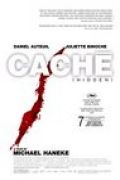
France 2005
Directed by
Michael Haneke
117 minutes
Rated MA
Reviewed by
Andrea Buck

Hidden
Synopsis: George (Daniel Auteuil) a TV literary show host and his wife Anne (Juliette Binoche) receive anonymous videotapes of surveillance footage of their own home, then, disturbing drawings, and eventually, more intimate surveillance of George’s movements. George delves into an investigation as to the source of this harassment and his family life begins to strain as he tries to hide the dark and shameful secrets of his past.This film starts slowly and deliberately, with voyeuristic surveillance images and sparse dialogue from the unseen characters so that we are left with much space to think and wonder. The drama picks up as family tensions rise: from the secrets George keeps from his wife and son, Pierrot (Lester Makedonsky); from the disturbing drawings sent to Pierrot at school; from the threat of George’s high-profile career being jeopardized by his shameful past; from the inclusion of friends in the goings-on; and then from the spark that ignites George to fight back and find out who is launching this attack on him and his family.
The intrigue grows until we’re wondering who could possibly be responsible: could it be Majid (Maurice Benichou), George’s childhood Algerian friend, orphaned when his parents attend a political rally, who he treated so shamefully that he clearly represents a legitimate source of lifelong guilt, whose squalor of a home George is mysteriously summoned to? Or could it be his son (Walid Afkir) who calls on George to witness his guilt after his father commits suicide, deliberately in George’s presence? Surely George is responsible for whatever drove his father to end his own life? And then, quite mysteriously, the film ends leaving you to ask who, how and why.
It wasn’t for quite some time that I wondered whether the narrative dead-end to the story was intended in order to keep the questions alive long enough to come up with the obscure possibility that no-one in the story was behind the camera at all? That the images sent back to George were more likely a narrative device to get the hardened, self-concerned man to face his own past and, more importantly his own guilt. Could it be that Haneke, the filmmaker himself, is intervening in his own story? That it is the filmmaker, not a character in the film, who is forcing George to re-visit his past and face his guilt, and that on a broader level, that is a responsibility of the filmmaker?
Hidden might be uncomfortable, as would be any unknown threat to our personal security, and creep under your skin. We now live in an era defined by guilt and fear and Haneke delivers us a film that is representative of the great fear of ‘the other’. In what feels like a social and political statement it represents how we might justify to ourselves lying and cheating to hide what we would prefer to keep hidden in order to save what we hold dear - with a caution that what is hidden will find a way back to confront us.
Hidden is not for those who are after a strong narrative story with mystery and intrigue but more a subtle social and artistic commentary, well made and very well acted. I was not alone when I walked out feeling rather perplexed, not quite sure what to think. But think I then did, and to appreciate this film, some thinking is required.

Want more about this film?


Want something different?




